About Sicily
About Sicily
A Rich Cultural Heritage
As well as having a beautiful coastline Puglia is also renowned as a land of castles, fortresses and cathedrals. Many of the hill-top castles date from medieval times and still dominate the horizon today, keeping watch on the valleys below for invaders from the safety of their fortified walls.
Renaissance fortresses dot the coastline still surveying the sea for any signs of marauders. They often took advantage of existing castles which made them virtually impregnable and for interested enthusiasts, rich in history.
Many of these arhcitectural gems offer a fascinating day out, often hosting events and normally housing museums or exhibitions within their walls. In Gioia del Colle the castle in the town centre is also home to an archaeological museum, while the privately owned castle at Oria exhibits ancient coins, engraved gems, statues, bronzes and pottery dating from Roman through to medieval times.
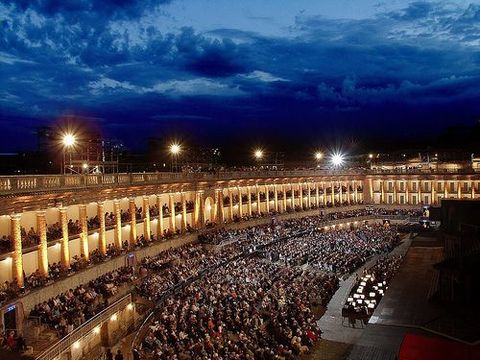
Now divided into five provinces, Puglia came to prominence first under Greek patronage and then as part of the Roman Empire. Brindisi became the commerical heartbeat of the area, providing a port through which passed almost all the goods from Egypt, Asia Minor, Macedonia, Syria and other prominent civilisations, bound for Rome.
With the fall of the empire came a less rosy period for the people of Puglia, constantly under attack from the Barbarians and forced to endure rebellions, pirate raids and several wars.
But with the arrival of the Normans the area began to prosper once more. Castles such as the one at San Vito dei Normanni sprang up, designed more for comfort and trade than the grim task of defence.
In more modern times Puglia developed economically with the introduction of better road and rail links and now modern industry and technology thrives alongside traditional farming and other industries.
Today the regional capital is Bari, and the other provincial capitals are Foggia, Brindisi, Lecce and Taranto. All offer a wealth of things to see and do, ensuring that any visitor to Puglia will not be lacking for cultural sustenance.
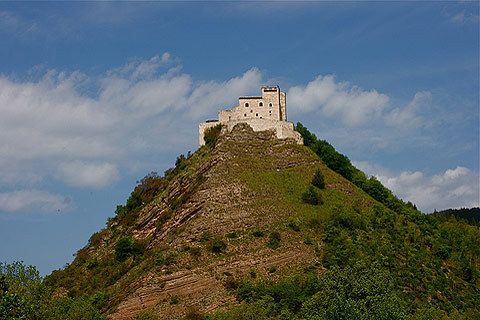
A Land of Sea and Sun
A stunning coastline, idyllic rural landscapes and a hot and sunny climate combine to make Apulia one of Italy's best treasured secrets and even today Puglia, to give its Italian name, is more popular as a summer retreat for Italian holiday-makers than for their foreign counterparts.
Puglia is a long thin region running down the Adriatic coast along the south and east of Italy's heel, so nothing is very far away from the beach. It's geographical location, linking Europe with Africa and the Middle East, has for millennia given it huge symbolism and no little importance as a meeting point for the diverse cultures which have helped shape our modern civilisation.
In northern Puglia, around Italy's spur, is the home of the Gargano National Park, a varied park of forest, arid step and sheer limestone cliffs which mantles the striking promontory.
Of the 270 or so species of nesting birds in Italy the park boasts an incredible 170 of them, testimony to its biodiversity, varied topology and the care with which it is all looked after by its proud people.
With such a conducive climate wine and olive oil are two of the region's most traditional and important products and this is reflected in the landscape, with the rich red soil hosting mile upon mile of ancient olive groves and vineyards.
But the Puglia landscape is much more than just vines and olive trees. It is a fascinating and unique tapestry of sand and stone, gentle rolling hills topped with the dazzling white architecture of the local towns, pasture and wheat fields, fruit orchards and stunning silent coves with crystal clear seas ideal for diving.
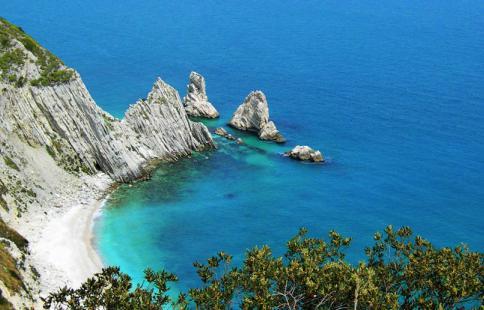
Medieval island castles and fortresses, sometimes with the Adriatic lapping at their very gates typify the coastline, along with rocky cliffs and sandy beaches, making Puglia a paradise for those with a love of the sea.
Naturally seafood is one of the principal staples on any menu but Puglia is also noted for its durum wheat and tomatoes, which form the basis for many mouth-watering pasta dishes.
And culturally Puglia is blessed with a host of museums and architectural and archaeological gems which recount the history of the region. From the trulli, the small beehive like dry-stone cathedrals that were traditionally the home of many in the area, to the masserie or farms, which take much of their inspired design from Roman villas and which still form the backbone of today's agricultural architecture.
In the larger towns and cities such as Bari and Lecce the variety of architecture is even greater and the latter, with its magnificent and ornate cathedral and other fine baroque architecture, rightly stakes claim to the title "Florence of the South."
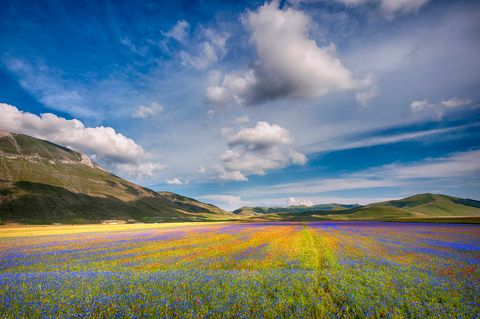
Sites & Sounds of Puglia
Puglia is full of interesting things to see and do and the people are warm and passionate - the most basic attempt to speak Italian will virtually guarantee you a warm and friendly reception.
Not surprisingly the Puglia region is favoured by many Italian holiday-makers for the range of delights it offers, from the culinary wonders served up in its many restaurants to a richness of art and history which bears testimony to the region’s rich mosaic of cultural influences.
SHOPPING
On a more modern footing, Puglia is a wonderful place to shop - from the chic to the antique the region caters for every taste. The markets of Alberobello and Grumo Apulla are of particular interest for those looking to bring back a souvenir of Puglia or an original Pugliese artefact. And the markets of Gallipoli and Copertino are rich in interesting antiques.
For discerning shoppers of fashion look no further than the chic boutiques of Bari, Lecce and Foggia.
Wine, olive oil and food products are also a prominent part of the Puglia economy.
During the summer months some towns hold their own outdoor antique markets. They stay open until at least midnight and are also a social occasion, combining wonderfully with that most Italian of pastimes, the passeggiata.
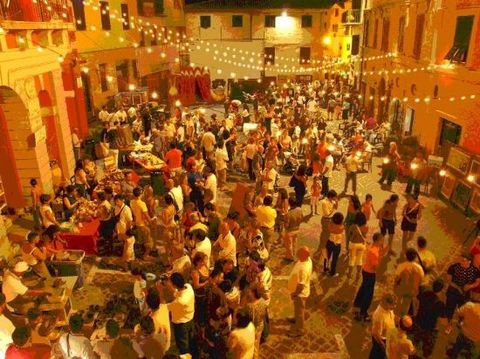
PLACES TO VISIT
There is a tremendous amount to see and do in Puglia - from indoor and outdoor theatre and concerts, to boat trips, walking, mountain biking, horseriding, or simply strolling through the many historic piazzas, soaking up the atmosphere.
The area is rich in Roman and Greek archaeological sites and there is an abundance of fine art and architecture to absorb.
Puglia boasts many historic theatres, art galleries and museums. Historic towns are dotted across the region and numerous castles and fortresses also house their own museums.
And indoor and outdoor concerts, ranging from classical, jazz, to rock and pop are held in most towns.
For nightlife the student-filled city of Lecce is very lively and Bari too has a wide choice of clubs, bars and restaurants.
Smaller towns such as Martina Franca come to life in the summer months when outdoor festivals and events go on until late at night.
Galleries and Museums:
• Bari - Pinacoteca Provinciale
• Barletta - Museo Civico e Pinacoteca
• Brindisi - Museo Archeologico Provinciale
• Conversano - Ciclo della Gerusalemme Liberata
• Fasano - Museo Nazionale di Egnazia
• Foggia - Museo Civico e Pinacoteca Comunale
• Gioia del Colle - Museo Archeologico Nazionale
• Gravina in Puglia - Pinacoteca Civica
• Lecce - Museo Archeologico Provinciale
• Lucera - Museo Civico "G. Fiorelli"
• Manfredonia - Museo Archeologico Nazionale
• Monte Sant'Angelo - Museo delle Arti e Tradizioni Popolari del Gargano
• Ruvo di Puglia - Museo Archeologico Nazionale
• Ostuni - Museo di Civiltà Preclassiche della Murgia Meridionale
• Squinzano - Museo delle Arti e Tradizioni Popolari del Salento
• Taranto - Museo Archeologico Nazionale
Concerts and Music Festicals:
• Martina Franca: Festival della Valle D'Itria mid July-mid August

Local Festivals
As throughout Italy in the summer months so it is in Puglia that festivals are part and parcel of the cultural fabric.
They range from small village affairs to highly organised events lasting several weeks, such as that of the Festival della Valle D'Itria, which takes place in Martina Franca every July and August and has been going strong for more than 30 years.
Open air concerts, opera, theatre and live music ranging from jazz to traditional Italian music are common themes throughout the various festas, sagra and festivals of Puglia.
Every town worth its salt throws a party of some description each year, from wine, beer, pizza or traditional food festas and sagras, to pagan festivals and carnivals. The majority but by no means all take place during the summer.
And if you happen to be in the Taranto province in August don't miss the surreal Moustache and Beard World Championships, held every year in Grottaglie. For lovers of a truly frightening amount of facial hair this is a must!
The first weekend in May generally hosts one of Bari's most important festivals, that of San Nicola. It marks the returning of his bones from Turkey and is a passionate mix of feasts, fireworks and flotillas of boats filling the harbour.
Many other religious feast days are also celebrated throughout the year and most towns have a patron saint whom they honour annually in suitable fashion. Normally local towns co-ordinate these public events, so you can go to all of them if you want !
All festivals are family friendly affairs, where even the smallest of children can be seen running around into the small hours.
Below are just a handful of some of the better known events which take place annually.
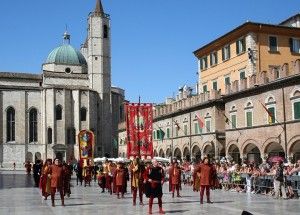
Event
Carnevale di Putignano
Festa di San Nicola
Cavallo Parato
Festival della Valle D'Itria
Danza della Spada
Baffi e Barbe
Place
Putignano
Bari
Brindisi
Martina Franca
Ruffano
Grottaglie
Period
February
early May
mid June
mid July - mid August
mid August
August
Simply Delicious
Italy's Puglia region offers the visitor such a feast of culinary delights it really is difficult to know where to start. Food and wine is almost a religion in Puglia, as it is througout Italy. And to enjoy the vast range of traditional flavours on offer you are advised to take your time and do the job thoroughly.
Eating out means encountering a wonderful variety of Italian dishes, usually divided into three courses (antipasti, primo piatto and secondo piatto) followed by dessert, coffee and the choice of a mind-boggling array of usually very potent liqueurs, called "digestive". If done properly the whole thing can easily last two or three hours!
You will probably notice different names for restaurants apart from ristorante, such as osteria, trattoria, agriturismo and pizzeria, but rest assured that all serve up a range of great Italian flavours to savour. Pizzerias generally open only in the evening because they use large wood ovens, but pizza can be bought by the slice from take-aways at lunchtime as well.
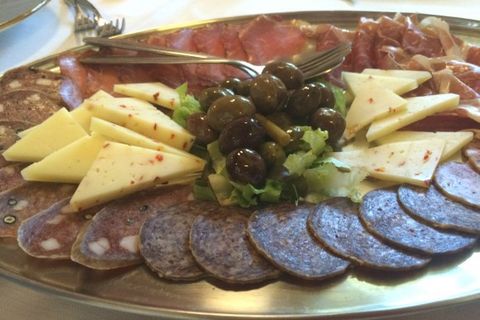
Seafood is excellent along the Adriatic coast, while inland traditional cooking of local organic produce is very much to the fore. Local dishes also include tasty sun-dried vegetables of every type imaginable, making Puglia one of the more vegetarian friendly regions of Italy.
The very fertile soil and hot dry climate of Puglia made it the bread basket of Roman times and today the region is still envied for the fine durum wheat it produces, which goes on to make the famed Altamura bread and various delicious types of pasta, including the celebrated orecchiette (ear-shaped pasta) often eaten with cime di rapa.
Also highly prized are the wines of Puglia, among them the D.O.C. wines of Barletta, Castel del Monte, Gioia del Colle, Locorotondo, Copertino, Lizzano, Martina Franca, Squinzano and for a sweet conclusion to the meal, Moscato di Trani.
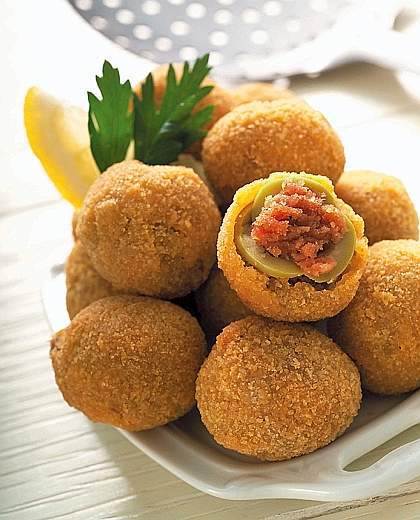
Many towns and villages in Italy's Puglia region have their own food and wine events. Here is a small selection of them:
January
. Festa di Sant' Antonio Abate (Novoli)
. Festa di Sant' Antonio Abate (Giovinazzo)
. Festa di Sant' Antonio Abate e fiera del fischietto (Rutigliano)
. Sagra di Sant'Antonio Abate (Rutigliano)
February
. Sagra della Farrata (Manfredonia)
. Festa di San Valentino (Vico del Gargano)
March
. Sagra di San Giuseppe (San Cassiano di Lecce)
April
. Fiera d'Aprile - "Sudgheusia" (Andria)
. Sagra del Pesce "a sarsa" (Castro)
. Premio Biol (Bitonio)
June
. Marangiane in Festa (Castri di Lecce)
July
. Sagra della Pitta Rustica (Castrignano de' Greci)
August
. Mercatino del Gusto (Magile)
. La focaccia piu' lunga del mondo (Mottola)
. Etnica World Music Festival (Diso)
. XI Sagra del Pesce e dei Prodotti Tipici (Cagnano Varano)
September
. La Ghironda (Martina Franca)
. Gioie del Mediterraneo (Gioia del Colle)
October
. Tra santi e santini (Taranto)
. "Lu paniri te e ssite" e festa del Maiale (Palmariggi)
. Sagra della"Tagghiarin" e festa della Madonna della Stella (Palagiano)
. Sagra "te la vulìa cazzata" (Martano)
. XVII Sagra della "pittula" (Vernole)
. Sagra del Maiale (Maggiano)
November
. Bacco nelle Gnostre (Noci)
. EQVINUM (Santeramo / Santeramo in Colle)
. Wine Fest (Gioia del Colle)
December
. Spongano in fiera (Spongano)
. Sagra della Pettola (Borgo Antico di Rutigliano / Rutigliano)
. Pettole nelle Gnostre e Cioccolato in sagra (Parco Letterario "Formiche di Puglia" / Noci)
. Presepe Vivente di Grumo Appula (Centro parrocchiale Monteverde / Grumo Appula)
Share
Tweet
Share
Mail


